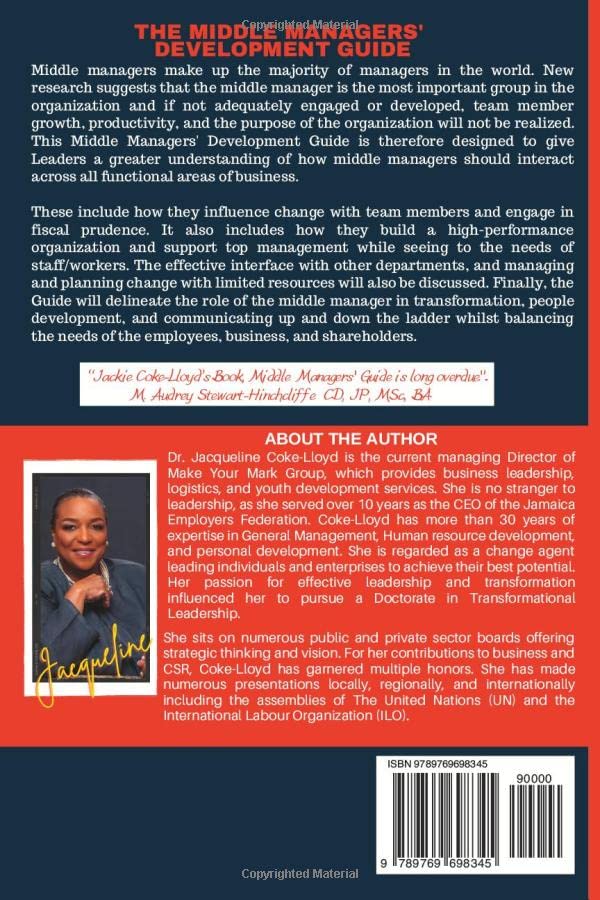The Critical Role Of Middle Managers In Employee Development And Organizational Effectiveness

Table of Contents
Middle Managers as Mentors and Coaches
Middle managers are uniquely positioned to act as mentors and coaches, providing invaluable support to their team members. Their daily interactions offer opportunities for both formal and informal learning and development.
Providing On-the-Job Training and Mentorship
Effective on-the-job training and mentorship are hallmarks of successful employee development strategies. Middle managers can implement various techniques to nurture their team's skills and knowledge:
- Regular check-ins: Scheduled one-on-one meetings allow for open communication, feedback delivery, and progress monitoring.
- Feedback sessions: Constructive criticism and positive reinforcement are crucial for growth. Focus on specific behaviors and provide actionable advice for improvement.
- Shadowing opportunities: Allowing team members to observe experienced colleagues in action provides valuable insights and practical learning.
- Mentorship programs: Formal mentorship schemes can pair junior employees with senior staff for guidance and support, boosting employee development. Middle managers can play a key role in facilitating these programs.
Identifying and Nurturing Talent
Middle managers are often the first to recognize high-potential employees within their teams. Their close interaction provides valuable insights into individual strengths, weaknesses, and aspirations. Strategies for identifying talent include:
- Performance reviews: Regular performance appraisals offer a structured way to assess employee performance and identify areas for development.
- 360-degree feedback: Gathering feedback from peers, superiors, and subordinates provides a holistic view of employee performance and potential.
- Observing employee behavior: Paying attention to employee initiative, problem-solving skills, and teamwork can reveal hidden talent and potential.
- Succession planning: Middle managers play a critical role in identifying future leaders, guiding their career development, and building a robust talent pipeline. This is essential for long-term organizational success.
Middle Managers as Champions of Employee Engagement and Motivation
Highly engaged employees are more productive, innovative, and committed. Middle managers are pivotal in fostering a positive work environment and boosting team morale, leading to higher levels of employee engagement.
Fostering a Positive Work Environment
Creating a supportive and encouraging atmosphere is essential for employee well-being and productivity. Middle managers can contribute by:
- Open communication: Encouraging open dialogue, active listening, and transparent communication builds trust and fosters a sense of belonging.
- Team-building activities: Organizing team-building events strengthens relationships and promotes collaboration.
- Recognition programs: Acknowledging and rewarding employee contributions boosts morale and motivates further effort. This is a crucial aspect of employee motivation strategies.
- Promoting work-life balance: Supporting employees in maintaining a healthy work-life balance demonstrates care and improves overall well-being.
Delegation and Empowerment
Effective delegation and empowerment are crucial for fostering employee engagement and development. By assigning challenging tasks and providing necessary resources, middle managers encourage ownership and autonomy. Best practices for delegation include:
- Clear expectations: Clearly define goals, deadlines, and expected outcomes.
- Providing necessary resources: Ensure employees have the tools, information, and support they need to succeed.
- Offering support: Provide regular check-ins and guidance without micromanaging.
- Trusting employees: Empowering employees to make decisions and take ownership promotes initiative and responsibility.
Middle Managers as Facilitators of Performance Management and Feedback
Middle managers play a critical role in driving employee performance improvement through regular feedback, performance reviews, and identification of training needs.
Conducting Regular Performance Reviews
Providing constructive feedback is crucial for employee growth. Middle managers should:
- Focus on behavior: Use specific examples to illustrate both strengths and areas for improvement.
- Offer actionable advice: Provide concrete suggestions for improvement rather than vague criticism.
- Create a two-way dialogue: Encourage open communication and allow employees to share their perspectives.
- Set clear performance goals: Collaboratively define measurable objectives for the coming period. Regular performance management is key to tracking progress.
Identifying Training Needs and Development Opportunities
Middle managers are often best positioned to identify skill gaps within their teams. They can use various methods, including:
- Skills assessments: Formal assessments can identify specific skill deficiencies.
- Observation: Regular observation of employees at work can reveal areas needing improvement.
- Employee self-assessments: Allowing employees to reflect on their own strengths and weaknesses provides valuable insights.
- Utilizing learning and development programs: Middle managers should recommend and facilitate access to relevant training programs to address identified skill gaps.
Conclusion
In summary, middle managers play a profoundly significant role in employee development and organizational effectiveness. Their ability to mentor, coach, engage, and provide constructive feedback directly impacts employee performance, retention, and overall organizational success. They are crucial for talent identification, career development, and succession planning, impacting the organization's long-term future. Investing in middle manager training for employee development is crucial for organizational success. By empowering your middle managers to champion employee development, you'll unlock the full potential of your workforce and achieve greater organizational effectiveness. Strengthen your organization by focusing on the critical role of middle managers in employee development.

Featured Posts
-
 Trespasses Channel 4 Drama Releases First Teaser Pictures
Apr 30, 2025
Trespasses Channel 4 Drama Releases First Teaser Pictures
Apr 30, 2025 -
 Becciu Il Processo D Appello Inizia Il 22 Settembre
Apr 30, 2025
Becciu Il Processo D Appello Inizia Il 22 Settembre
Apr 30, 2025 -
 Blue Ivy Carters Super Bowl Style A Detailed Look
Apr 30, 2025
Blue Ivy Carters Super Bowl Style A Detailed Look
Apr 30, 2025 -
 Untucked Ru Pauls Drag Race Season 16 Episode 11 Free Online Viewing
Apr 30, 2025
Untucked Ru Pauls Drag Race Season 16 Episode 11 Free Online Viewing
Apr 30, 2025 -
 Fdyht Shbab Bn Jryr Alqdae Yhkm Ela Ryys Alnady
Apr 30, 2025
Fdyht Shbab Bn Jryr Alqdae Yhkm Ela Ryys Alnady
Apr 30, 2025
